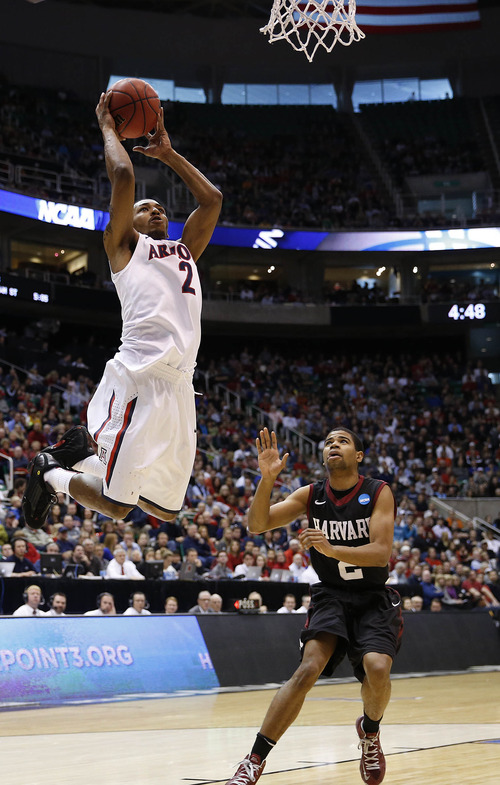This is an archived article that was published on sltrib.com in 2013, and information in the article may be outdated. It is provided only for personal research purposes and may not be reprinted.
Never have read Einstein's paper on special relativity — maybe some of the Harvard student-athletes had — called "On the Electrodynamics of Moving Bodies," written a century ago, but it might have explained some of what happened between the Crimson and the Wildcats on Saturday.
Turns out, Arizona's moving bodies were bigger than Harvard's — and more energetic. Something about the mass of a body is a measure of its energy content? Beats me. But while we're mixing and matching theories, how about this one:
Slower, smaller bodies don't hang with faster, larger ones.
It would have taken all of a few minutes for a blind man to grasp as much in Game 1 of the two-game NCAA Tournament set at EnergySolutions Arena.
Harvard missed its first 13 shots. Eight minutes in, it was already 17-2, Wildcats. The Crimson, who utilized timely and accurate shooting to upset New Mexico on Thursday, didn't hit their first field goal in this game until the 12:14 mark of the first half. By then, it was over.
"That doomed us from the start," Harvard coach Tommy Amaker said.
So, let's keep it all straight and simple: Harvard tried real hard in what turned out to be a 74-51 loss. But Cinderella had a couple of huge crimson zits on her nose here. Arizona was better in every aspect, much of it centering on that speed and size differential, on the basic laws of physics and mechanics.
"Getting the ball down low is something we wanted to do, and controlling the boards," said Arizona forward Solomon Hill. "We had a bigger team, so controlling the boards and limiting them on second shots really controlled the game."
Said Harvard guard Christian Webster: "They pounced on us from the beginning. I think it took us by surprise how hard they played, how physical they were, and ... their length and size and speed. From there, it was just an uphill battle."
An impossible battle.
One of the major pieces for the Wildcats was Hill. In a 14-second stretch in the first half, he hit a 3 from the corner, and then ripped a ridiculous two-handed flying jam that gave Arizona a 30-9 lead. A few minutes later, point guard Mark Lyons, who scored 27 points on 12-of-17 shooting, flipped in consecutive alley-oops, the second one moving the lead to 34-15.
In response, the Crimson could do nothing.
They didn't score from inside and they couldn't score from outside. They wished they could have thought of another place from which to try. Actually, that one place was the free-throw line, where they outscored the Wildcats, 14-11.
Even when Harvard made shots, the degree of difficulty made it clear to the Crimson that the Arizona defense would yield nothing easy to them.
"They were tremendous on defense, their rotations, their size," said Harvard guard Siyani Chambers. "Their length was a problem, but give all the credit to them; they played a great game and they played great defense."
Wesley Saunders, Harvard's top scorer this season, was 1 of 11 from the floor. "Wesley didn't finish, and he's our best finisher," Amaker said. Laurent Rivard, who played such an important role against the Lobos, was 1 of 6, all of those attempts coming from long range. "They locked down on him," said Amaker. Chambers hit just 2 of 8 shots. "They did an outstanding job of guarding our shooters," Amaker said.
"The shots we missed at the beginning were open," Webster said. "We should have made them. If we would have made the shots, maybe the game would have been different."
And if the Crimson had been bigger and longer and faster, the game would have been different, too.
All the smaller numbers added up to the bigger ones on the scoreboard:
Arizona hit 27 field goals, Harvard 16.
Arizona made 9 of 15 from beyond the arc, Harvard just 5 of 18.
Arizona shot 55 percent, Harvard 27.
Arizona hauled 39 boards, Harvard 33.
Arizona had 30 points in the paint, Harvard had 20.
"Arizona played an outstanding game," Amaker said. "They deserved to win."
It was a matter of physics.
Gordon Monson hosts "The Big Show" with Spence Checketts weekdays from 3-7 p.m. on 97.5 FM and 1280 and 960 AM The Zone. Twitter: @GordonMonson.



